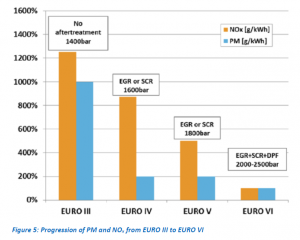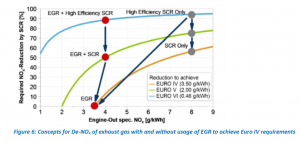New Engine Concepts and Optimisation for Air Pollution Emission Reduction
- emission, engine concepts, Inland Shipping, Pollution
Both EURO VI and NRMM Stage IV came into effect in 2014, with the tightest emissions levels to date (NOx < 0.4 [g/kWh], Particle Matter < 0.01 resp. 0.025 [g/kWh]). To meet the regulations, Original Equipment Manufacturers (OEMs) have resorted to the after-treatment technologies like selective catalytic reduction (SCR), and/or exhaust gas recirculation (EGR), with a diesel particulate filter (DPF). Besides the after-treatment systems the EURO VI and Stage IV engines were further developed on:
– Fuel injection systems have moved from low-pressure systems, to electronic, high-pressure systems reaching up to 2,700 bar;
– Combustion pressure is up to more than 200 bar;
– The turbochargers are now variable-geometry models, which help driveability as well as meeting emissions standards.

The OEMs have adopted two types of after-treatment system concepts for EURO VI requirements:
• SCR, DPF in combination EGR;
• SCR-only (High Efficiency SCR).

The SCR-only solution offers some advantages over the EGR system:
– Increased engine efficiency and reduced particulate matter (PM) produced by the combustion;
– Compact and lean design, both of the engine and the High Efficiency after-treatment system, lowering weight and installation space;
– No combustion products back into cylinder;
– No additional cooling requirements;
– Lower specific fuel consumption [g/KWh].
The disadvantage of the higher NOx-emissions is that it requires increased usage of AdBlue, influencing the operational costs.
Real new engine concepts are scarce, basically in all sectors. The largest changes for the past decades are the addition of EGR, SCR and DPF and minimising the negative impacts of this. These are possible loss of efficiency, wear, fouling and maintenance costs. The addition of EGR to inland waterway transport (IWT) marine is not expected, because it ads complexity to the engine and it is not needed to achieve the Stage V levels.
Low compression engines would be an alternative (Mazda, Iveco) as well as liquefied natural gas (LNG) operated engines, which do not pollute at all (no NOx, no PM, no unburnt fuel).
- Source
EU-Wide Strategy for Innovation Uptake in Inland Waterway Transport (IWT), (09/03/2017, EIBIP)
- Owner(s) / Author(s)
- EIBIP Secretariat
- Publication date
- 09/03/2017
- Date of entry
- 11/06/2018
- Date of updated
- 23/08/2018